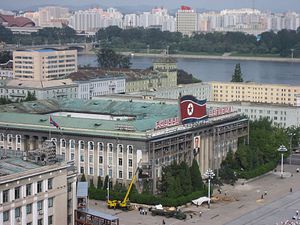Rumors emerged this week, based on reports from South Korea’s intelligence services, that a major leadership shake-up might have taken place in Pyongyang. Kim Jong-Un reportedly fired his uncle Jang Song-Thaek and staged a public execution of his associates. Voice of America reports that Seoul’s National Intelligence Agency briefed South Korean lawmakers on the situation, noting that Jang was likely removed as vice chairman of the reclusive and militaristic state’s National Defense Commission (NDC). Jang’s associates were publicly executed for “anti-party activities.”
Given the opacity of domestic political happenings within North Korea, reasons for the purge are open to speculation. That said, it is likely that the purge emblematizes Kim Jong-Un’s continued consolidation of power. One South Korean analyst notes that “Jang’s ouster and the public execution of his associates means they had probably formed a significant political clique of their own.” The purge is Jang’s second at the hands of a ruling Kim; Kim Jong-Il had him purged in 2004 during a power struggle, but reinstated him shortly thereafter.
Kim Jong-Un’s move was interpreted similarly by DailyNK, a website run by several North Korea defectors. In its coverage, DailyNK referred to Jang and his clique as an “alternate locus of power.” The website had noted the waning influence of Jang and his clique earlier this year as well. The DailyNK report mentions the broader political ramifications of Jang’s purge. North Korea’s top diplomats in Cuba and Malaysia are both reportedly members of his family and are now likely to be recalled to Pyongyang. Similarly, Jang’s ancillary role, as head of the Administration Department, will necessitate a replacement.
The purge raises questions about Kim Jong-Un’s ambitions as leader of North Korea. It could be that by removing such a significant member of his father’s “old guard,” the younger Kim is attempting to fully pivot his country back towards a system of individual governance. In this sense, the removal of Jang might actually be destabilizing given his deep involvement in the North Korean economy and experience dealing with the outside world. Certainly analysts have read the situation as Kim wanting to exert a form of “generation shift” — one expert, Andrei Lankov, notes that “the young forces are rising and pushing out the old. Kim Jong Un can’t run the country when he has subordinates who are twice his age.”
Jang Song-Thaek has had a long career in the North Korean government. He was elected to the National Defense Commission, the post from which he was reportedly purged this week, in April 2009 at the 12th Supreme People’s Assembly. Jang is married to Kim Jong-Un’s aunt — Kim Jong-Il’s sister — Kim Kyong-Hui. The couple regularly appeared with Kim Jong-Il during his public appearances. According to South China Morning Post, Jang wasted no time in spreading his influence as Kim Jong-Il’s health waned; he was appointed vice-chairman of the NDC in 2010.
The origin of his power laid with his wife, who was Kim Jong-Il’s only full sibling. Jang, acting from a relative position of immunity as the late-Kim’s brother-in-law, was relatively “liberal” for a member of the North Korean regime. Reports have suggested that he may have been one of the more influential voices in Pyongyang calling for economic reform and a gradual opening up of the country. Jang managed to avoid the fate of his associates, who were executed, probably due to the continued influence of his wife.
Kim Kyong-Hui, Jang’s wife, is reported to be extremely ill, possibly on the verge of death. If she were to die, Jang’s fate might suddenly become a lot more uncertain. It remains to be seen if Kim Jong-Un might take more extreme actions against his uncle in the future.

































